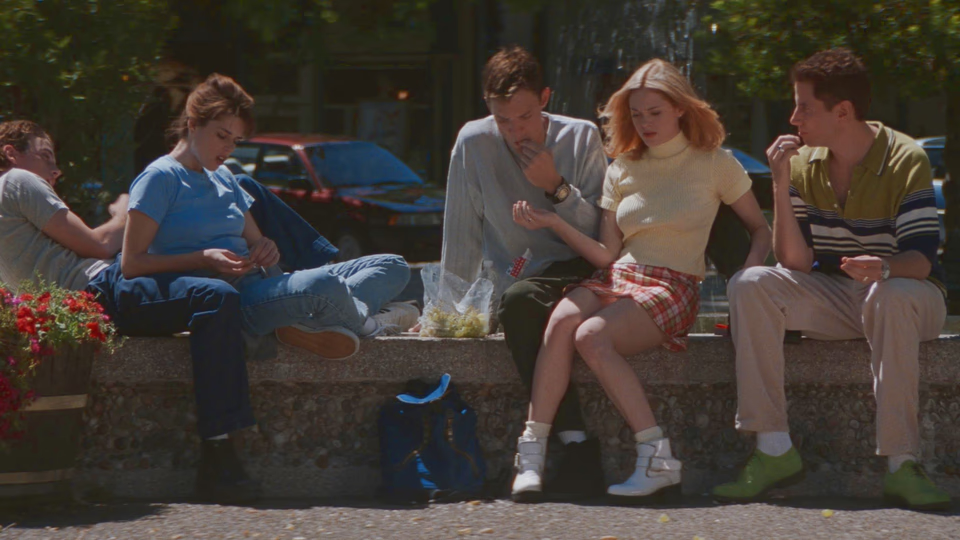Scream

“Do you like scary movies?” asks the killer in Scream, before subjecting his victim to a deadly movie trivia game. The same question might be asked of the movie itself, which seems less interested in being a scary movie than in being about scary movies. This is a horror film that carries its PhD in Horror Film Studies, and wears it on its sleeve.
Directed by Wes Craven, who gave us A Nightmare on Elm Street (1984) and has been interrogating his own genre since New Nightmare, this is a movie that wants to have its cake and eat it too. It wants to frighten us while making fun of the ways movies try to frighten us. Sometimes this works—such as a scene where a victim lies watching Halloween (1978) on the television, yelling for Jamie Lee Curtis to turn around while we see the killer loom behind him—but too often the film trips over its own cleverness.
The story follows the standard slasher template: A masked killer terrorizes teenagers in a small California town. Sidney Prescott (Neve Campbell) becomes the primary target, a year after her mother’s murder. Around her orbit the usual suspects: a doofus boyfriend, a plucky best friend, and various other potential victims or killers. But here’s the twist—they all know they’re in what feels like a horror movie. They know the rules, they’ve seen the films, and they still can’t escape.
Craven orchestrates the proceedings with his usual technical skill. The opening sequence with Drew Barrymore is a masterclass in sustained tension, even if it brazenly cribs from Hitchcock’s Psycho (1960) by killing off its most marketable star in the first reel. But where Psycho used this shock to set up an existential meditation on identity and madness, Scream uses it merely as a clever gotcha moment.
The screenplay by Kevin Williamson is both the film’s greatest strength and its Achilles heel. In a post-Tarantino world, Williamson stuffs the dialogue with movie references that often feel forced, as if the characters aren’t talking to each other, but to the audience, showing off Williamson’s video store knowledge. It doesn’t help that many of the young actors, while photogenic, lack the verbal dexterity to sell these lines. Worse still, their TV-pretty faces lend a sheen of artifice, making one long for the raw authenticity of earlier slasher film casts.
What’s most interesting about Scream is what it represents: the gentrification of the slasher film. Gone are the grimy production values and exploitation elements that marked the genre’s heyday. In their place we get glossy cinematography, bloodless violence (relatively speaking), and a cast that looks like they stepped out of a WB drama. The killer himself has been domesticated—no longer an unstoppable force of nature, but a clumsy opportunist who trips, falls, and gets beaten up by his intended victims.
This domestication extends to the film’s politics. While earlier slasher films often carried a puritanical subtext about sex and drugs, Scream neuters these elements entirely. Its teenagers are largely sexless creatures who speak in careful euphemisms about their relationships. The film wants to reference R-rated horror while maintaining a teen-friendly sensibility, resulting in an odd tonal disconnect.
Yet despite these criticisms, Scream works more often than it doesn’t. Craven’s command of suspense remains impressive, and there’s something oddly compelling about watching a horror movie that knows it’s a horror movie. The film’s influence would prove enormous, spawning numerous imitators and effectively creating a new subgenre of self-aware horror.
But one can’t help wondering if this self-awareness comes at too high a price. By turning horror into a game of spot-the-reference, Scream sacrifices the primal power that made its predecessors so effective. It’s like watching a magic show where the magician explains every trick—entertaining, perhaps, but lacking in true wonder.
Still, within its chosen parameters, Scream succeeds more than it fails. It’s a clever, well-crafted thriller that, if it doesn’t exactly reinvent the wheel, at least gives it an interesting new spin. Just don’t expect it to actually scare you—it’s too busy winking for that.